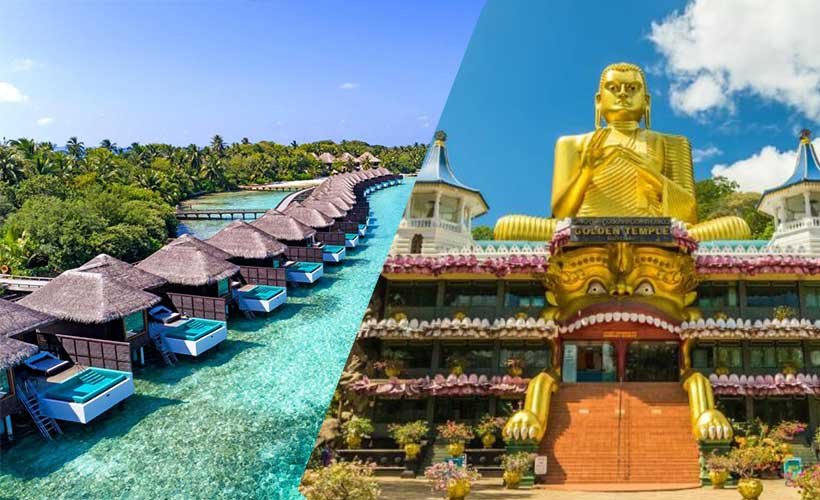The relationship between Sri Lanka and the Maldives is multifaceted, spanning historical, cultural, economic, and political dimensions. In this discourse, I’ll delve into the intricacies of this relationship, exploring its evolution over time, key areas of cooperation, challenges faced, and prospects for the future.
Historical Background:
The historical ties between Sri Lanka and the Maldives date back centuries. Both nations share a common cultural heritage, influenced by Buddhism and Hinduism. The Maldives, an archipelago strategically located in the Indian Ocean, has historically served as a trade hub, attracting merchants and travelers from neighboring regions, including Sri Lanka. This historical connection laid the foundation for future interactions and collaborations between the two nations.
Diplomatic Relations:
Formal diplomatic relations between Sri Lanka and the Maldives were established soon after both countries gained independence from colonial rule. Sri Lanka opened its embassy in Malé, the capital of the Maldives, in 1972, and the Maldives reciprocated by establishing its embassy in Colombo, Sri Lanka, in 1973. These diplomatic missions serve as crucial platforms for fostering bilateral ties, facilitating communication, and promoting cooperation in various fields.

Economic Cooperation:
Economic cooperation between Sri Lanka and the Maldives encompasses trade, investment, tourism, and development assistance. Sri Lanka is a significant trading partner for the Maldives, with bilateral trade primarily consisting of goods such as food products, textiles, and machinery. Both countries have also explored opportunities for joint ventures and investment in sectors such as tourism, fisheries, and renewable energy.
Tourism is a vital component of the economies of both Sri Lanka and the Maldives. The Maldives, known for its pristine beaches and luxury resorts, attracts millions of tourists annually, including a significant number from Sri Lanka. This mutual tourism influx fosters people-to-people exchanges and strengthens cultural ties between the two nations.
Additionally, Sri Lanka has provided development assistance to the Maldives in various forms, including technical expertise, capacity-building programs, and infrastructure projects. These initiatives aim to support the Maldives’ socio-economic development goals and enhance its resilience to external challenges such as climate change and natural disasters.
Cultural Exchange:
Cultural exchange plays a pivotal role in strengthening the bond between Sri Lanka and the Maldives. Both countries share common cultural elements, including language, cuisine, and traditional customs. Sri Lankan and Maldivian artists, musicians, and performers often collaborate to showcase their cultural heritage through exhibitions, festivals, and cultural exchanges.
Furthermore, educational exchanges between Sri Lanka and the Maldives promote academic cooperation and facilitate the exchange of knowledge and expertise. Scholarships, student exchange programs, and collaborative research initiatives enhance human capital development and foster intellectual engagement between the two nations.
Security Cooperation:
Security cooperation between Sri Lanka and the Maldives has gained significance in recent years, driven by shared concerns over maritime security, piracy, and transnational crime in the Indian Ocean region. Both countries recognize the importance of safeguarding their maritime borders and ensuring the safety and security of sea lanes crucial for trade and commerce.
Collaborative efforts in maritime security include information sharing, joint patrolling, and capacity-building initiatives aimed at enhancing the capabilities of law enforcement agencies and coastguards. Additionally, Sri Lanka and the Maldives participate in regional forums such as the Indian Ocean Rim Association (IORA) and the Indian Ocean Naval Symposium (IONS) to address common security challenges and promote regional cooperation.
Challenges and Opportunities:
Despite the positive aspects of bilateral relations, Sri Lanka and the Maldives face several challenges that could potentially strain their relationship. Economic disparities, environmental concerns, political instability, and competition for maritime resources are among the challenges that both countries need to address through dialogue, cooperation, and mutual understanding.

Furthermore, geopolitical dynamics in the Indian Ocean region, including the presence of major powers and strategic rivalries, could influence the trajectory of Sri Lanka-Maldives relations. Both countries must navigate these complexities while safeguarding their sovereignty, territorial integrity, and national interests.
However, amidst these challenges lie opportunities for deeper cooperation and collaboration. By leveraging their respective strengths and resources, Sri Lanka and the Maldives can explore new avenues of partnership in areas such as renewable energy, sustainable development, and regional connectivity. Enhanced people-to-people exchanges, cultural diplomacy, and youth engagement initiatives can also contribute to fostering a stronger sense of solidarity and mutual respect between the two nations.
In conclusion, the relationship between Sri Lanka and the Maldives is characterized by historical ties, cultural affinity, and shared interests in various fields. While facing challenges, both countries have demonstrated a commitment to enhancing bilateral cooperation and deepening their strategic partnership. By addressing common challenges, leveraging opportunities, and nurturing mutual trust and understanding, Sri Lanka and the Maldives can build a resilient and mutually beneficial relationship that contributes to peace, stability, and prosperity in the Indian Ocean region.
